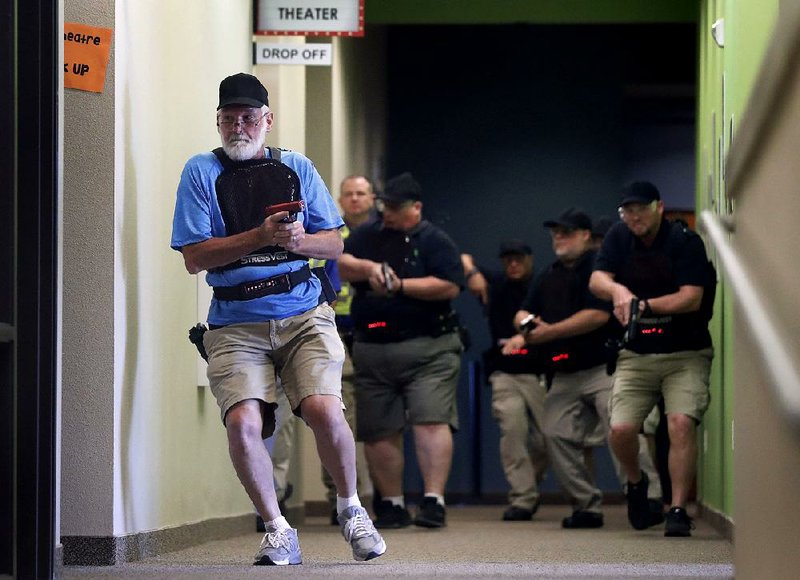HASLET, Texas -- Anxiety over mass shootings has led some churches to start training and arming their worshippers with guns.
Not all security experts support this approach, but it has gained momentum as congregations across the country grapple with how to secure spaces where welcoming strangers is a religious practice.
"Ten years ago, this industry was not a thing," said David Riggall, a Texas police officer whose company trains churchgoers to volunteer as security guards. "I mean, sanctuary means a safe place."
Doug Walker said security wasn't at the fore of his mind in 1993 when, as a recent Baptist seminary graduate, he founded Fellowship of the Parks church in Fort Worth. But six years later, after a gunman killed seven people and took his own life at another church in the Texas city, the pastor's thinking changed, he said.
Today, the interdenominational church has four campuses and 3,000 worshippers on an average Sunday, Walker said. It has increased security as it has grown, asking off-duty police to carry weapons at church events. And it recently hired Riggall's company, Sheepdog Defense Group, to train volunteers in first aid, threat assessment, de-escalation techniques, gun use and tactical skills, such as clearing rooms during an active shooting.
Walker, 51, said there wasn't a single event that prompted his church to decide its guards needed more training. But Riggall said that after mass shootings, congregations reach out.
"Every time the news comes on and there's another shooting in a school or church or something like that, the phone starts ringing," Riggall said.
The 46-year-old police officer said he and a colleague had the idea for the company after the 2012 mass shooting at an elementary school in Newtown, Conn. They started doing firearms training with parents and, after Riggall became certified under Texas law to train security guards, transitioned to churches.
The company incorporates Christian teachings into its courses, and more than 90 people at 18 churches have completed the 70 hours of initial training to become state-licensed guards, Riggall said. The so-called sheepdogs are insured and technically are employed by the company. But they volunteer as security at their own churches, which in turn pay Riggall.
On a Sunday in July, Brett Faulkner stood with an AR-15 in hand and his back to the cross in the sanctuary of the Fellowship of the Parks campus in Haslet, a community about 15 miles north of Fort Worth.
He pointed the rifle at a young woman's back and yelled at the armed men advancing into the room: "I'm going to kill this woman. It's going to happen right now."
Faulkner, a 46-year-old information technology worker, already completed a Sheepdog session but went to another church's meeting to play the bad guy and keep his skills sharp.
"It really just comes down to caring about the people in that building," Faulkner said of choosing to guard his small Baptist church.
Faulkner said his congregation re-evaluated its security after recent mass shootings and went with Riggall's company as a cost-effective option. "This is a good balance between the cost of paying professionals and relying on untrained volunteers," he said.
Security professionals differ on what balance is right.
After 11 worshippers were shot dead last year during Shabbat morning services at a synagogue in Pittsburgh, the city's Jewish community has added layers of defenses.
Since that October attack, congregations that once felt guns were unnecessary or inappropriate have welcomed armed security, said Brad Orsini, security director for the Jewish Federation of Greater Pittsburgh. But arming worshippers is not an approach the former FBI agent recommends.
"Carrying a firearm is an awesome responsibility," said Orsini, who served in the Marine Corps before his nearly three decades with the FBI. "Because you have the ability to have a carry concealed permit does not make you a security expert. Because you have a firearm doesn't necessarily mean you should be carrying it at the church on the weekend."
A Section on 08/18/2019
